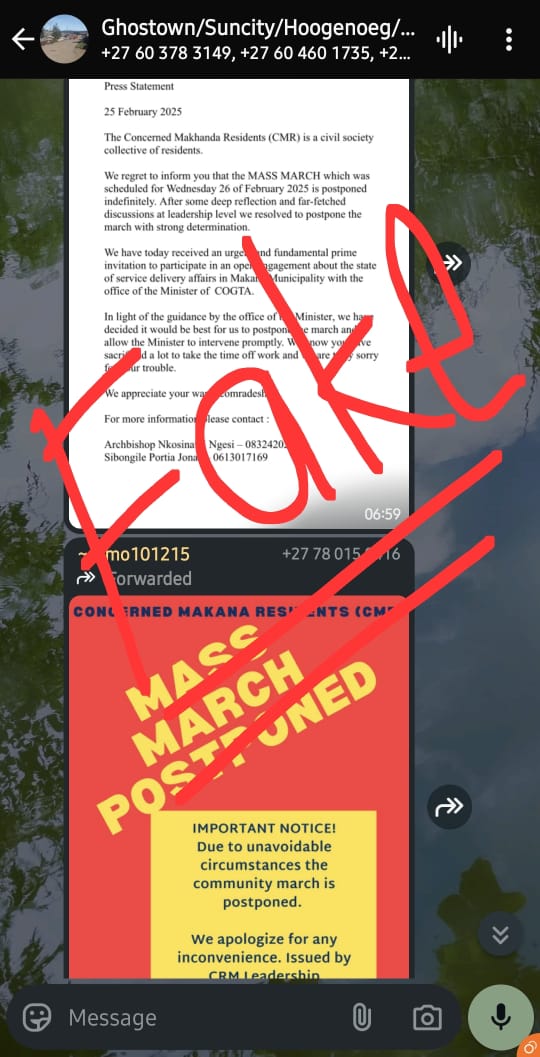By Karabo Matalajoe and Busuku Ntombekhaya
Hundreds of Makhanda residents and Rhodes University students braved the rain on Wednesday to march on City Hall from opposite ends of the city to protest the ongoing water crisis. They called for the removal of
Makana Municipality executive mayor Yandiswa Vara, speaker Mabhuti Matyumza and chief financial officer Nomfundo Ntsangani.
The demonstration was marked by impassioned speeches and strong calls for action, led by Archbishop Nkosinathi Ngesi from the Ethiopian Episcopal Church, who held hands with the town’s clergy at the front of the long march from Fingo Village. Speakers condemned the extreme impact of the crisis on education, businesses and general health and well-being and strong calls for action.
Community and student leaders issued several demands, including:
- A transparent investigation into financial mismanagement within the municipality
- Immediate measures to ensure stable and sufficient water supply
- Government intervention to hold accountable those responsible for service delivery failures
- The implementation of water storage solutions similar to those in neighbouring municipalities
Mayor Vara did not meet with the protestors.
At the end of the protest, leaders held a meeting to discuss their demand for a response within 14 days. “If the response they bring us is not satisfactory, we will have to take it further—to the President and ultimately to Parliament,” Ngesi said.

Attempts to scupper protest fail
The protest was not without controversy. Leading up to the demonstration, fake messages circulated on social media claiming that the march had been cancelled after an agreement was allegedly reached between Archbishop Ngesi and the municipality.
“The message circulated that I had cancelled the march was propaganda and a lie from them. That actually gave us courage because truth has a way of revealing itself,” said Archbishop Ngesi. “They were lying—
maybe some people believed them—but we are here marching, and this proves that they are lying.”

In addition, just before midnight on Tuesday, Makhanda Municipality belatedly published posters advertising two meetings, one for small businesses and one for the community works programme, to hand out jobs at the same time as the march.
One resident commented on Facebook: “They are playing with us. They don’t want a march – yhuu they are so naughty.”
“They don’t sleep – they are owls,” another quipped.
Despite the attempted decoys and misinformation campaigns, the protest proceeded as planned. Protesters handed over a petition to Dr Masilo Mokoena, a representative from the Deputy Minister’s office, calling for the immediate removal of key municipal officials.
Corruption and financial mismanagement
Community leaders made it clear that their protest was not politically motivated. “We are not here for the ANC, the EFF, or any political party,” said Archbishop Ngesi. “We are here because we are suffering and demand solutions.” The petition detailed allegations of financial mismanagement and corruption within the municipality. “We want the Special Investigating Unit (SIU) to investigate where our tax money is going,” Ngesi demanded. “How can they claim they have been working on water solutions for over ten years with no visible improvement?”
Resident Annamarie Fourie expressed her frustration: “We didn’t have water for 120 days before Christmas. Tanks were going around, but nothing in my area.”

Concerns over contaminated water
Archbishop Ngesi highlighted the health risks posed by the water crisis, revealing that some residents are forced to drink contaminated water shared with animals. “We have water that we drink with faeces, and that water can potentially cause a deadly disease [from]E. coli. We are degraded. Our human rights are taken away from us by our leaders,” he said.
The absence of clean water has created significant hardships for the community. Schools have been forced
to function without proper sanitation, and untreated sewage leaks pose serious health hazards. Protesters stressed that immediate intervention is needed to address these pressing concerns.

to express their anger at the municipality’s ongoing service delivery
failures. Photo: Chalotte Mokonyane
Rhodes SRC demands action
Rhodes University SRC members played a significant role in the protest, demanding urgent action on the ongoing water crisis.
Rhodes SRC President Siyanda Vilakazi called the situation a violation of basic human rights. “Our municipality is failing to provide basic human rights like water and sanitation,” Vilakazi stated. “We cannot have a situation where water supply is intermittent or absent for days, weeks, or even months. It is unconstitutional.”
A Rhodes student echoed these concerns: “Sometimes the university doesn’t have water coming out of our taps, and we are forced to get water from the Jojo tanks outside. It is even more difficult for us as girls when we are on our periods because we need to bathe and wash our clothes regularly, but we cannot due to the
sthe ituation we have.”
SRC President Siyanda Vilakazi further warned about the economic repercussions. “If Rhodes were to shut down because of these conditions, the local economy and GDP of Makhanda would suffer greatly.”
Churches stand with the people
Religious leaders also took a firm stand. Bishop William (Sox) Leleki said the leaders of Makana Municipality have neglected their duty to serve the people. “First of all, we want the municipality leaders to understand that they are leading the people of God and should stop treating them as if they own them. They should make decisions based on the needs of the people and not for their own benefit,” he said. “Makana Municipality leaders must ensure that people receive water at all times because water belongs to God.”
The protest highlighted the deep frustration of Makhanda residents and their determination to secure
access to a fundamental human right—clean and consistent water. With growing public pressure, the municipality now faces heightened scrutiny.

Makhanda City Hall. Photo: Chalotte Mokonyane


